Heart problems are common in older pets, and are becoming increasingly common in younger dogs and cats. Congestive heart failure (CHF) is the result of a heart problem that has progressed to the point where the heart can’t pump blood through the body adequately.  Other organs try to compensate for the lack of oxygenated blood, but without proper circulation stemming from the heart, these systems begin to fail, as well. Without proper blood supply to the kidneys, fluids build up causing edema, a swelling of the ankles, legs, abdomen, et cetera. Less blood to the major organs causes fatigue and difficulty performing tasks. Less blood to the brain causes many problems.
Other organs try to compensate for the lack of oxygenated blood, but without proper circulation stemming from the heart, these systems begin to fail, as well. Without proper blood supply to the kidneys, fluids build up causing edema, a swelling of the ankles, legs, abdomen, et cetera. Less blood to the major organs causes fatigue and difficulty performing tasks. Less blood to the brain causes many problems.
Cardiomyopathy and mitral insufficiency are two common heart problems. Heartworm information is on the Viral Infections page. Animals can also get hypertension (high blood pressure), which will be discussed at the end of this webpage. Dogs and cats don’t have heart attacks or atherosclerosis the way people do. When dogs and cats have a heart condition, the problem is usually a weakened heart muscle, causing an 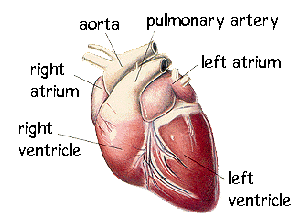 enlargement of one or both sides of the heart and poor circulation, but cholesterol is not an issue.
enlargement of one or both sides of the heart and poor circulation, but cholesterol is not an issue.
Animals can be born with a congenital heart defect. Most often, though, heart disease is the result of poor nutrition, poor health, and lack of exercise, or it can be the result of some other disease such as hyperthyroidism, kidney or liver failure, or a viral or bacterial attack. Commercial pet foods, the increase in toxins in the environment, and over-vaccination are all thought to be contributing factors to the increased incidence of heart disease.
 Among cats, cardiomyopathy is the most common heart disease. Heart muscles become abnormally enlarged and thickened, and they may stiffen. The weakened heart loses the ability to pump blood effectively, causing arrhythmia (irregular heartbeats) and leading to heart failure.
Among cats, cardiomyopathy is the most common heart disease. Heart muscles become abnormally enlarged and thickened, and they may stiffen. The weakened heart loses the ability to pump blood effectively, causing arrhythmia (irregular heartbeats) and leading to heart failure.
Among dogs, mitral insufficiency is a common problem. Defective functioning of the mitral valve causes blood leakage which results in a heart murmur. Mitral insufficiency is more common in smaller breeds, whereas larger breeds tend to get an enlarged, weakened heart. All conditions lead to congestive heart failure if not controlled, and all of these conditions need to be diagnosed by your veterinarian and managed properly under his or her care. Do not attempt to treat heart problems on your own.
Symptoms include:
 Lethargy
Lethargy- Depression
- Weakness
- Weight loss
- Bloating
- Difficulty breathing
- Decreased appetite
- Progressive cough
- Bluish tinted gums and tongue
- Excessive panting without much exertion
The cough and shortness of breath is a result of blood backing up into the lungs because the heart cannot pump it efficiently. Fluid can also build up in the abdomen causing a bloated belly. If the problem is not treated, symptoms will progress to where the animal can’t even walk and will drown in the excess fluids that have accumulated in the lungs.
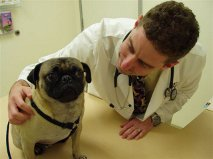 If you suspect your pet may have a heart condition, see a holistic veterinarian immediately. The earlier it’s detected, the better your veterinarian will be able to treat the heart condition.
If you suspect your pet may have a heart condition, see a holistic veterinarian immediately. The earlier it’s detected, the better your veterinarian will be able to treat the heart condition.
As with every serious disease, prevention is the best medicine. A nutritious raw meat diet as described on the Diet page and sufficient exercise are the best things you can give your pet to ensure a healthy heart. If, however, your dog or cat already has a heart problem, your holistic veterinarian will need to do a thorough examination and prescribe a regimen tailored to your pet. The therapy may be conventional and naturopathic treatments combined.
 Most veterinarians say that heart problems are never cured, but the progression of the disease can be curtailed. A number of holistic veterinarians, however, report many cases where the animal is as good as cured and lives in excellent health to a very ripe old age. If you’d like to read about one of the many success stories, see “Snuffy” in
Most veterinarians say that heart problems are never cured, but the progression of the disease can be curtailed. A number of holistic veterinarians, however, report many cases where the animal is as good as cured and lives in excellent health to a very ripe old age. If you’d like to read about one of the many success stories, see “Snuffy” in
Real Life Stories.
And here are some quotes from Pat Lazarus’s book, Keep Your Dog Healthy the Natural Way:
 “I estimate that, using natural therapies, I successfully treat dogs with early to moderate heart disease 97 to 98 percent of the time. In treating hypertension, I have almost complete success.”
“I estimate that, using natural therapies, I successfully treat dogs with early to moderate heart disease 97 to 98 percent of the time. In treating hypertension, I have almost complete success.”
– Norman C. Ralston, D.V.M.
 “By far, most of the dogs I treat for hypertension get well. … I really haven’t seen much improvement in dogs treated with orthodox therapies. Most of them are too nervous, too hyperactive.”
“By far, most of the dogs I treat for hypertension get well. … I really haven’t seen much improvement in dogs treated with orthodox therapies. Most of them are too nervous, too hyperactive.”
– S. Allen Price, D.V.M.
 “I’ve had cases of heart disease that were absolutely given up on by other veterinarians, because the cardiograms indicated there was no hope. Natural therapy has improved the animals’ health greatly and has given them years more life.”
“I’ve had cases of heart disease that were absolutely given up on by other veterinarians, because the cardiograms indicated there was no hope. Natural therapy has improved the animals’ health greatly and has given them years more life.”
– Michael V. Lemmon, D.V.M.
Below are a number of supplements and nutritionals that have been found to help with heart health. Your veterinarian will decide what treatments are best for your pet’s particular situation. Again, do not attempt to treat your pet’s heart condition on your own.
Herbal and Naturopathic Help
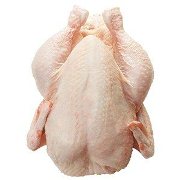 A natural diet made of fresh, raw foods is a must. The healthier the food, the less energy your pet will need to filter out toxins and waste products. That energy can be used for healing, instead.
A natural diet made of fresh, raw foods is a must. The healthier the food, the less energy your pet will need to filter out toxins and waste products. That energy can be used for healing, instead.
Minerals are essential. Magnesium, “nature’s calcium channel blocker,” is vital for heart health and many cellular functions. In Keep Your Dog Healthy the Natural Way, Dr. H. H. Robertson  describes how heart problems can occur when our dog or cat’s digestive system isn’t able to break complex proteins down into amino acids that are usable by the body. He states that the large protein chunks get stuck and can accumulate to dangerous levels in the circulatory system, causing an increase in heart rate. “Eventually,” he states, “the heart wears itself out.” Magnesium helps release nitrogen from the protein compounds, and helps the body to eliminate the unwanted, indigestible portions. Magnesium also helps regulate muscle tone and heartbeat.
describes how heart problems can occur when our dog or cat’s digestive system isn’t able to break complex proteins down into amino acids that are usable by the body. He states that the large protein chunks get stuck and can accumulate to dangerous levels in the circulatory system, causing an increase in heart rate. “Eventually,” he states, “the heart wears itself out.” Magnesium helps release nitrogen from the protein compounds, and helps the body to eliminate the unwanted, indigestible portions. Magnesium also helps regulate muscle tone and heartbeat.
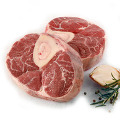 Other important minerals include selenium, zinc, and chromium. Potassium interacts with salts in the body, and is important in cases of hypertension, discussed below. It’s important that potassium levels are balanced, so you need to discuss proper mineral supplementation with your holistic veterinarian. Low levels of selenium have been linked to cardiomyopathy and other diseases, including cancer. In addition to being an antioxidant, selenium works synergistically with other antioxidants, such as heart healthy vitamin E, to improve their efficacy.
Other important minerals include selenium, zinc, and chromium. Potassium interacts with salts in the body, and is important in cases of hypertension, discussed below. It’s important that potassium levels are balanced, so you need to discuss proper mineral supplementation with your holistic veterinarian. Low levels of selenium have been linked to cardiomyopathy and other diseases, including cancer. In addition to being an antioxidant, selenium works synergistically with other antioxidants, such as heart healthy vitamin E, to improve their efficacy.
 Vitamin E helps strengthen heart muscles and improve circulation, as well as helping the cells to fight oxidation. And vitamin C is also a beneficial component of circulation system maintenance.
Vitamin E helps strengthen heart muscles and improve circulation, as well as helping the cells to fight oxidation. And vitamin C is also a beneficial component of circulation system maintenance.
Supplementing just one mineral can often upset something else in your pet’s system. A balance is required for optimal health. Raw bones are an excellent way to give your pets a balanced source of minerals.
Without question, the most effective way to give your pet vitamins and minerals is by providing these nutrients in the fresh ingredients of their diet. In the section on Diet, we list a number of vitamins and minerals along with some of the best food sources of these nutrients. If, however, you think your pet’s diet may not contain enough of the desired vitamins and minerals, you need to give a supplement. There is some controversy, even in people health, as to which form of supplementation is best. Some say, for example, that colloidal minerals have the highest rate of absorption. Others say colloidal minerals may contain toxins.
We’re still not sure which form of mineral supplementation is best, but the studies done on citrated minerals seem to be the most convincing. You’ve probably noticed that minerals and other nutrients often have two names – calcium carbonate, calcium citrate, ferrous oxide, ferrous sulfate, et cetera. All supplements have issues with absorption, but minerals bound to citrate have been shown to have acceptable and predictable levels of absorption. So, if you buy a citrated product that has been tested for content, you have some assurance of digestibility and reliable assurance that the supplement doesn’t contain unwanted ingredients. Still, receiving nutrients from fresh food is best.
Fish oil, an excellent source of vitamins A and D and essential fatty acids (such as omegas) is recommended for all pets with heart problems. Research has shown that fish oil helps to reduce the amount of heart muscle mass lost in dogs with heart failure. In addition, it is good for skin and coat, the digestive tract, and for reducing inflammation throughout the body.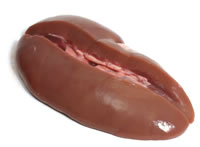
Coenzyme Q10 (CoQ10) is directly involved in supplying energy to the cells of the body. All cells need energy, and studies have shown a link between heart disease and deficiencies in CoQ10. This is a very important supplement both for the prevention and treatment of heart disease. It’s also a valuable antioxidant, helping to protect the cells from oxidation. It can take up to eight weeks to see the beneficial effects of CoQ10 supplementation.
The amino acids L-carnitine and taurine are both important for heart health, particularly in cases of dilated cardiomyopathy, a disease common in cocker spaniels and cats. L-carnitine strengthens the heart muscle and improves  metabolism in the heart. In the Encyclopedia of Nutritional Supplements, Dr. Michael Murray states, “a deficiency in carnitine in the heart would be similar to driving an automobile without a fuel pump. There may be plenty of fuel, but there is no way to get it to the engine.” Taurine helps with contractions of the heart muscle and is especially important for cats as they need adequate amounts in their diet. Taurine is found almost entirely in animal tissue, as in raw meat. Cooking destroys this amino acid.
metabolism in the heart. In the Encyclopedia of Nutritional Supplements, Dr. Michael Murray states, “a deficiency in carnitine in the heart would be similar to driving an automobile without a fuel pump. There may be plenty of fuel, but there is no way to get it to the engine.” Taurine helps with contractions of the heart muscle and is especially important for cats as they need adequate amounts in their diet. Taurine is found almost entirely in animal tissue, as in raw meat. Cooking destroys this amino acid.
With the emergence of commercial pet foods decades ago, cats began to develop diseases such cardiomyopathy and blindness at alarming levels. Eventually, after many pet deaths, scientists realized that cats needed taurine. There are many other nutrients in raw meat that heat destroys. Who knows what ill-effects their deficiencies are causing? Commercial pet food has been a trial and error process, with your pets as the lab rats. And the sad fact is that instead of attributing the increase in disease to what we are feeding our pets, we’ve shown a history, along with the help of our veterinarians, to simply accept that these diseases were inevitable at the time they occur.
Another supplement found to help with heart conditions is Hawthorn. 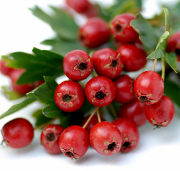 Many holistic veterinarians have had great success with this herb. The phytochemicals in hawthorn berry enhance blood flow to the heart and throughout the circulatory system. Hawthorn supports the pumping action of the heart muscle. It can increase the power of digoxin, a commonly prescribed heart medication, which is another reason to work with your holistic veterinarian and not to treat your pets without professional help. It can take six to eight weeks for the full effects of hawthorn to kick in.
Many holistic veterinarians have had great success with this herb. The phytochemicals in hawthorn berry enhance blood flow to the heart and throughout the circulatory system. Hawthorn supports the pumping action of the heart muscle. It can increase the power of digoxin, a commonly prescribed heart medication, which is another reason to work with your holistic veterinarian and not to treat your pets without professional help. It can take six to eight weeks for the full effects of hawthorn to kick in.
 Gotu kola, cayenne, gingko, garlic, ginger, grape seed extract, and bilberry are also often used by holistic veterinary practitioners for pets with heart problems. These supplements help with circulation. Ginger is normally used for nausea, gastrointestinal problems, and motion sickness, but it’s also used as a heart tonic for dogs and cats. While grapes are bad for dogs, grape seed extract is not. The chemical composition of the two are very different. Bilberry helps to strengthen capillaries. Fo-ti protects and dilates blood vessels, increasing blood flow to the heart. It is also thought to act as an adaptogen, correcting system imbalances.
Gotu kola, cayenne, gingko, garlic, ginger, grape seed extract, and bilberry are also often used by holistic veterinary practitioners for pets with heart problems. These supplements help with circulation. Ginger is normally used for nausea, gastrointestinal problems, and motion sickness, but it’s also used as a heart tonic for dogs and cats. While grapes are bad for dogs, grape seed extract is not. The chemical composition of the two are very different. Bilberry helps to strengthen capillaries. Fo-ti protects and dilates blood vessels, increasing blood flow to the heart. It is also thought to act as an adaptogen, correcting system imbalances.
Supplements used to detoxify the body are also helpful when treating heart disease. For a list of some of these supplements, see the Cancer, Kidney, or Liver sections.
Two supplements that Pat Lazarus mentions in Keep Your Pet Healthy the Natural Wayare Vasculin and Cardio-Plus. These products have been around for decades, and the ingredients have been updated with advancements in heart science. They contain bovine heart extract and liver extract, plus other heart healthy ingredients such as natural CoQ10 and omega-3 rich fish oils. 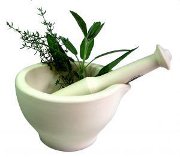 Dr. Norman Ralston calls them “very good products” and Dr. Michael Lemmon is quoted as saying, “I’ve had cases that were absolutely given up on by other veterinarians because the cardiograms indicated there was no hope. These two products, though, improved the animals greatly and are giving them years more of life.” He recommends that pet owners crush the pills and mash them into the pet’s food.
Dr. Norman Ralston calls them “very good products” and Dr. Michael Lemmon is quoted as saying, “I’ve had cases that were absolutely given up on by other veterinarians because the cardiograms indicated there was no hope. These two products, though, improved the animals greatly and are giving them years more of life.” He recommends that pet owners crush the pills and mash them into the pet’s food.
Hypertension is a little different. If your dog or cat has been raised on a natural diet, you won’t have to worry about high blood pressure. If your pet has been on a commercial pet food, however, and develops hypertension, switching to a natural diet may be all you need to do to correct the issue, unless other organs of the body have already been affected. If that’s the case, you’ll need to switch the diet, and then work at treating each affected organ.
 If you take your pet to a conventional veterinarian, and hypertension is diagnosed, that veterinarian may want to put your pet on a “prescription diet.” We urge you to get a second opinion from a holistic veterinarian. A fresh, raw food diet is far better for your pet. Most veterinarians, however, are trained to prescribe these commercial foods. If you, yourself, were diagnosed with any kind of alarming condition, do you think that feeding yourself processed food from a bag or can, food that had been cooked at extremely high temperatures and treated to not spoil on shelves, would be best for yourself? Or would a fresh diet made of natural foods be a better way to supply your body with the nutrients it needs? And why would your dog or cat be any different?
If you take your pet to a conventional veterinarian, and hypertension is diagnosed, that veterinarian may want to put your pet on a “prescription diet.” We urge you to get a second opinion from a holistic veterinarian. A fresh, raw food diet is far better for your pet. Most veterinarians, however, are trained to prescribe these commercial foods. If you, yourself, were diagnosed with any kind of alarming condition, do you think that feeding yourself processed food from a bag or can, food that had been cooked at extremely high temperatures and treated to not spoil on shelves, would be best for yourself? Or would a fresh diet made of natural foods be a better way to supply your body with the nutrients it needs? And why would your dog or cat be any different?
We’re not saying the nutrients you need are the same as your pet. We’re saying there is a huge difference between getting your species-appropriate nutrients from fresh, 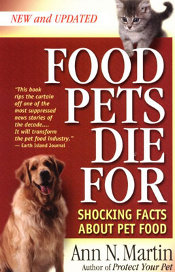 natural sources rather than from an extremely over-processed source that is mass marketed in bags and cans. If you have ever wondered where the pet food companies, even the ones that make the “prescription diets” get their protein from, read Ann Martin’s book, “Food Pets Die For.” You will be shocked to learn that roadkill, euthanized animals that may have flea collars on, diseased cows deemed unfit for human consumption, and tumors from chickens are just some of the protein sources that go into the rendering vats that sell mass quantities of protein to the pet food companies.
natural sources rather than from an extremely over-processed source that is mass marketed in bags and cans. If you have ever wondered where the pet food companies, even the ones that make the “prescription diets” get their protein from, read Ann Martin’s book, “Food Pets Die For.” You will be shocked to learn that roadkill, euthanized animals that may have flea collars on, diseased cows deemed unfit for human consumption, and tumors from chickens are just some of the protein sources that go into the rendering vats that sell mass quantities of protein to the pet food companies.
Sodium and potassium work together in the body, which is why potassium is often prescribed for hypertensive human patients. It’s imperative that you consult with your holistic veterinarian before trying to treat your pet with potassium or any other mineral because high doses of one can upset the balance of other minerals.
If your pet is overweight, see the section on Weight Problems. Excess fat puts strain on the heart muscle because it has to pump blood through all that fat, so keep your pet at a healthy weight.
Exercise is also important, but the strenuousness will depend on the level of heart disease your pet has. Healthy pets should get at least an hour of exercise per day. If your pet already has a heart condition, though, you’ll have to be more careful. And it’s harder, of course, to control a cat’s exercise than a dog’s. If you let your dog or cat sit around all day, the heart problem will get worse. But the problem will also get worse if you try to exercise your pet too vigorously for the condition. An example of appropriate exercise would be taking your dog for a walk and watching for
but the strenuousness will depend on the level of heart disease your pet has. Healthy pets should get at least an hour of exercise per day. If your pet already has a heart condition, though, you’ll have to be more careful. And it’s harder, of course, to control a cat’s exercise than a dog’s. If you let your dog or cat sit around all day, the heart problem will get worse. But the problem will also get worse if you try to exercise your pet too vigorously for the condition. An example of appropriate exercise would be taking your dog for a walk and watching for  signs of overexertion. Tailor the walk to the dog’s condition.
signs of overexertion. Tailor the walk to the dog’s condition.
If you smoke, the second hand smoke is also problematic to your pet’s condition.
Homeopathy
 Again, do not try these remedies on your own. Seek help from a holistic veterinarian if you think your pet has a heart condition. With all of the treatments below, if you see no improvement within a relatively short time, talk to your homeopathic veterinarian. Don’t continue with the same treatment if it is not working.
Again, do not try these remedies on your own. Seek help from a holistic veterinarian if you think your pet has a heart condition. With all of the treatments below, if you see no improvement within a relatively short time, talk to your homeopathic veterinarian. Don’t continue with the same treatment if it is not working.
For mild heart weakness, give Calcarea fluorica 6x one time. Calcarea carbonica 30c can also be used to strengthen the heart muscle, particularly in overweight animals. Do not repeat treatment without consulting an experienced professional.
After an attack in which the animal collapses or faints after exertion and the tongue turns blue, give Digitalis purpurea 6c. Other symptoms that may be present in this condition are abnormal or slow pulse, dilated heart, fluid retention, and liver problems. As with all of these treatments, do not attempt to treat your pet without guidance from an experienced homeopathic veterinarian. If used incorrectly, you could do severe harm to your pet.
For heart conditions that include shortness of breath with a severe dry, hacking cough that’s worse in the open air and with exercise – the cough will sound raspy and violent – and possibly bluish-tinted tongue and gums, give Spongia Tosta 6c one to four 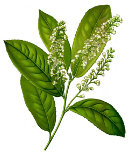 times daily. If no response, try Laurocerasus, below.
times daily. If no response, try Laurocerasus, below.
If exercise brings on extreme breathlessness or fainting, and the tongue and gums take on a bluish tint, give Laurocerasus 6c one to three times daily.
For heart conditions related to nervousness or over-excitability, give Kali phosphoricum 6x once daily.
For weak, dilated hearts, difficulty breathing, fluid retention, and irritiabilty related to a heart condition, give the homeopathic form of hawthorn berry, Crataegus oxyacantha 1x to 3x, once daily.
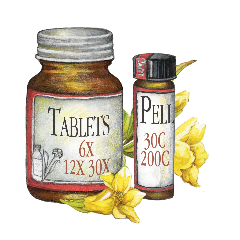 For conditions that include weak hearts, valve problems, erratic, faint, and frequent pulse, difficulty breathing, and possible fluid retention, loss of appetite, vomiting, obesity, and itchy skin, give Strophanthus hispidus 3c twice daily, twelve hours apart, for seven to ten days. Allow no food or water within ten minutes of treatment.
For conditions that include weak hearts, valve problems, erratic, faint, and frequent pulse, difficulty breathing, and possible fluid retention, loss of appetite, vomiting, obesity, and itchy skin, give Strophanthus hispidus 3c twice daily, twelve hours apart, for seven to ten days. Allow no food or water within ten minutes of treatment.
If the pulse is quick and irregular, and breathlessness is pronounced, give Lycopus virginicus 3x.
For valve disease with a rapid and weak pulse, fluid retention, and decreased or unusual urination, give Adonis ver 1x.